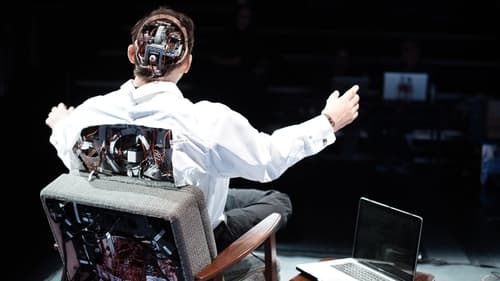
Director
In Rimini Protokoll’s new production, Christian Hempel steps onto the stage for the first time, together with musician and geriatric nurse Benjamin Jürgens and politician Bijan Kaffenberger. They also have Tourette. Collectively with musician Barbara Morgenstern, they put theatre to the test: to what degree can theatre tolerate an absence of intent? How much protection can theatre offer? And after the applause is over, it may become clear that this piece isn’t really about Tourette. It is actually about the audience, about theatre and about the fear of losing control.

Producer
We mostly think of robots as work machines, as efficient and precise executors of tasks. In German industry, they barely look like people, to avoid emotional complications. Unlike in Asia, where humanoid robots have already been developed for some time, for example for care-work or as sex partners. The external similarity to human beings makes the acceptance of machines easier. However, if the machine is too similar to a human, we begin to feel mistrust: what is human, what is machine? Japanese robotics researchers call this weird similarity the “uncanny valley”. For his play, Stefan Kaegi works with a writer and playwright for the first time: Thomas Melle allowed an animatronic double of himself to be made. This humanoid takes the author’s place and throws up questions: what does it mean for the original when the copy takes over? Does the original get to know himself better through his electronic double? Do the copy and his original compete or do they help each other?

Director
We mostly think of robots as work machines, as efficient and precise executors of tasks. In German industry, they barely look like people, to avoid emotional complications. Unlike in Asia, where humanoid robots have already been developed for some time, for example for care-work or as sex partners. The external similarity to human beings makes the acceptance of machines easier. However, if the machine is too similar to a human, we begin to feel mistrust: what is human, what is machine? Japanese robotics researchers call this weird similarity the “uncanny valley”. For his play, Stefan Kaegi works with a writer and playwright for the first time: Thomas Melle allowed an animatronic double of himself to be made. This humanoid takes the author’s place and throws up questions: what does it mean for the original when the copy takes over? Does the original get to know himself better through his electronic double? Do the copy and his original compete or do they help each other?

Director

Director
Imagine you are buying a ticket at the box office for an individual show on a specific day, but are not led to the auditorium of the theatre. Instead, you get the key for a room and a sketch of how to get there. It might be a room in the theatre, an office, or an apartment somewhere close by. You open the door and you find a phone ringing. You pick up the phone and a person with a strange accent strikes up a conversation with you. The person seems to know the room you are sitting in, even though he is about 10.000 km away. The voice belongs to a call centre agent from Calcutta, India. A story is about to develop and you realize that the call centre agent and you and your city are the very first protagonists of the plot.



